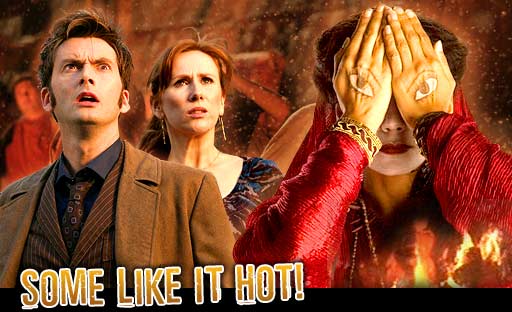
Aired 12 April 2008
Following the more lighthearted and comical ‘Partners in Crime,’ the fourth series of the modern Doctor Who jumps head first into the realm of much heavier and meaningful material, presenting the Doctor with one of the most challenging moral dilemmas he’s ever faced. The programme has usually strayed away from explaining why the Doctor doesn’t look to change random daily accidents and tragedies or even try to warn people of impending disasters, and while ‘The Fires of Pompeii’ isn’t created to completely explain his actions, setting it in Pompeii on the eve of the volcanic eruption that cost some 20,000 lives does help to explain at least part of his relationship with time.
Of course, the need to keep Doctor Who grounded at least somewhat in reality with a very modern and relatable Earth at its core alone precludes the Doctor from taking extreme timeline-altering action in the past, but so, too, does the fact that changing histories on a whim would make him no better than the other would-be dictators and oppressive regimes he has helped to topple regardless of his own sense of morality or righteousness. As such, ‘The Fires of Pompeii’ is very much presented as a story that tells the costs of upholding established history, even if tales of the alien presence and amazing fortune-telling abilities of its populace have been lost to time.
Unfortunately, even though the story is bold enough to have Donna make the Doctor confront the possibility of saving so many lives despite what the history books say, it doesn’t fully address the reason that he does not. The answer provided that Pompeii is a fixed point in time is satisfactory enough in a sort of Gallifreyan wave of the hand manner, but nothing too much deeper is ever given to explain why Pompeii is one but other crises the Doctor has helped to avert are not. Accordingly, it is difficult for ‘The Fires of Pompeii’ to have a resounding dramatic resolution.
Doctor Who has always done well with its historical (or pseudo-historical) stories, and the set design and production values wonderfully bring Pompeii to life. Later on, there’s a superb blending of history and science fiction together into something really quite special and inspiring. The stone circuits and the Pyroviles appearing as lava monsters with Roman helmets are genuinely satisfying props and effects. And though the ancient Roman family acting very modern may not be completely in line with the episode is trying to do, it does make the characters more amenable to the younger audience.
It’s towards the end when the story becomes something truly special by spinning the underlying ethical question into asking how the Doctor can actively participate in the deaths of so many thousands of people. He can do it because it ends up being the lesser of two evils, but the relationship between Donna and the Doctor takes on as much importance here as the Doctor’s relationship with history when Donna reaffirms her belief in the Doctor by helping him press the detonation device. Donna is already proving to be a perfect match for the Tenth Doctor, unafraid to challenge him and question him about his authority and moral obligation. Catherine Tate is surprisingly adept at shouldering the emotional burden as required and her horrified reactions to the fates of all of the people is incredibly natural and realistic. She also proves to be the anchor to humanity that this incarnation of the Doctor so desperately needs, forcing him to realize that he can still save somebody if not everybody, lending a sense of human scale to his grand adventures.
So while the big question about how the Doctor decides when and where to intervene remains open, ‘The Fires of Pompeii’ offers a great entry into solid drama for this new series and new companion. The many different storylines of the alien Pyroviles, the sisterhood, and the fortune-tellers (the competitive fortune-telling scene providing a spectacular highlight as so much insight is gained into the Doctor and Donna’s past and presumed futures) may not all be fully explored, the execution of the events on screen is superb.


May 11, 2021
[…] Gallifreyan Ramblings; The M0vie Blog; Spiralbound Notebooks; Tapetrade; Time Lord Archives; Junkyard View; Lyratek; Random Whoness; Doctor Who Reviews. […]